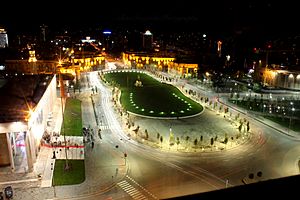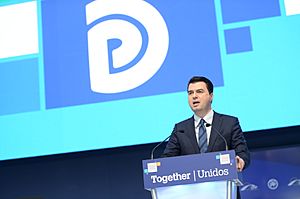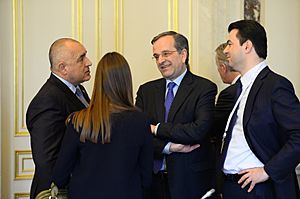Lulzim Basha facts for kids
Quick facts for kids
Lulzim Basha
|
|||||||||||||||||||||||||||||||||||||||||||||||||||
|---|---|---|---|---|---|---|---|---|---|---|---|---|---|---|---|---|---|---|---|---|---|---|---|---|---|---|---|---|---|---|---|---|---|---|---|---|---|---|---|---|---|---|---|---|---|---|---|---|---|---|---|
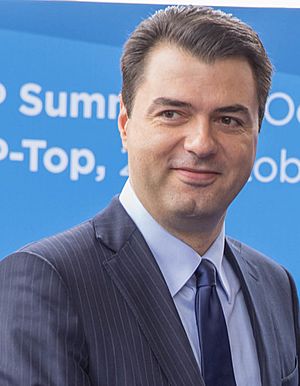
Basha in 2016
|
|||||||||||||||||||||||||||||||||||||||||||||||||||
| Leader of the Opposition | |||||||||||||||||||||||||||||||||||||||||||||||||||
| In office 15 September 2013 – 21 March 2022 |
|||||||||||||||||||||||||||||||||||||||||||||||||||
| President | Bujar Nishani Ilir Meta |
||||||||||||||||||||||||||||||||||||||||||||||||||
| Prime Minister | Edi Rama | ||||||||||||||||||||||||||||||||||||||||||||||||||
| Preceded by | Edi Rama | ||||||||||||||||||||||||||||||||||||||||||||||||||
| Succeeded by | Sali Berisha | ||||||||||||||||||||||||||||||||||||||||||||||||||
| Leader of the Democratic Party | |||||||||||||||||||||||||||||||||||||||||||||||||||
| In office 22 July 2013 – 21 March 2022 |
|||||||||||||||||||||||||||||||||||||||||||||||||||
| Preceded by | Sali Berisha | ||||||||||||||||||||||||||||||||||||||||||||||||||
| Succeeded by | Sali Berisha | ||||||||||||||||||||||||||||||||||||||||||||||||||
|
|||||||||||||||||||||||||||||||||||||||||||||||||||
| Member of the Albanian Parliament | |||||||||||||||||||||||||||||||||||||||||||||||||||
| In office 10 September 2021 – 8 July 2025 |
|||||||||||||||||||||||||||||||||||||||||||||||||||
| Constituency | Tirana County | ||||||||||||||||||||||||||||||||||||||||||||||||||
| In office 2 September 2005 – 20 February 2019 |
|||||||||||||||||||||||||||||||||||||||||||||||||||
| Constituency | Tirana County (2009-2019) 33th Constituency (2005-2009) |
||||||||||||||||||||||||||||||||||||||||||||||||||
| Personal details | |||||||||||||||||||||||||||||||||||||||||||||||||||
| Born | 12 June 1974 Tirana, Albania |
||||||||||||||||||||||||||||||||||||||||||||||||||
| Political party | Euroatlantic Democrats (2024–present) | ||||||||||||||||||||||||||||||||||||||||||||||||||
| Other political affiliations |
Democratic Party (2005–2024) | ||||||||||||||||||||||||||||||||||||||||||||||||||
| Spouse | Aurela Basha | ||||||||||||||||||||||||||||||||||||||||||||||||||
| Children | 2 | ||||||||||||||||||||||||||||||||||||||||||||||||||
| Alma mater | Utrecht University (LLB) | ||||||||||||||||||||||||||||||||||||||||||||||||||
| Occupation |
|
||||||||||||||||||||||||||||||||||||||||||||||||||
| Signature | |||||||||||||||||||||||||||||||||||||||||||||||||||
Lulzim Basha (born 12 June 1974) is an Albanian politician and lawyer. He was the leader of the Democratic Party of Albania and the Leader of the Opposition from 2013 to 2022. He is now the founder and leader of a political party called Euroatlantic Democrats.
He ran for Prime Minister of Albania in the 2017 and 2021 elections. He lost both times to the current Prime Minister, Edi Rama.
Contents
Early Life and Education
Lulzim Basha was born in Tirana, Albania, on 12 June 1974. His mother was from Kosovo-Albanian background, and his father was Albanian.
After finishing high school, he studied law at Utrecht University in the Netherlands. He then worked for the International Criminal Tribunal for the former Yugoslavia. He was part of a team that investigated war crimes in Kosovo from 1998 to 1999.
In 2000, Basha joined the Department of Justice of the UN administration in Kosovo, known as UNMIK. He worked there as a legal advisor and later as a deputy chief. He served as a special advisor for transition in the same department until January 2005.
Lulzim Basha is married to Aurela Basha, who is from the Netherlands. They have two daughters named Victoria and Dafina.
Political Career
Basha started his political journey by joining the Democratic Party of Albania in January 2005. He quickly became a leader within the party. Since then, he has held several important jobs in governments led by the Democratic Party.
Serving in the Government (2005–2011)
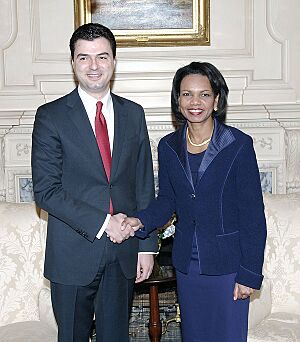
Basha was the spokesperson for his party during the 2005 parliamentary elections. He was elected as a Member of Parliament for Tirana. After that, he became the Minister of Public Works, Transport, and Telecommunications for two years.
After the 2009 election, Basha was appointed as the Minister of Internal Affairs. In this role, he worked to meet the requirements for Albanians to travel without a visa to countries in the Schengen area. This included making Albania's border and immigration systems more modern. He also helped issue secure biometric passports and fought against crime. These efforts were praised by international groups like Europol. Because of his work, the EU decided on 8 November 2010 to allow Albanian citizens to travel without visas starting 15 December 2010.
Mayor of Tirana (2011–2015)
In 2011, Basha ran for mayor of Tirana, the capital city. He won against Edi Rama, the leader of the Socialist opposition, by a very small number of votes. It was a very close election.
As mayor, Basha promised to make big changes in his first 100 days. He wanted to make the city government more open to citizens and free from political arguments.
His main goal was to create a new plan for the city's growth. This plan aimed to bring more investments, create jobs, and solve traffic problems in the city center.
A draft of this plan was shared in May 2012. It was seen as very important for the city's future economy. The plan suggested improvements to the road network and public transport. It proposed adding a tramway system and building a new boulevard in the northern part of the city. The plan also included fixing up the Lanë river.
The old plan for Skanderbeg Square was changed. The new plan allowed vehicles to use a narrower road around the center of the square, which also included bicycle lanes. Trees were planted in many areas, making the square greener.
In May 2013, the City Hall started a project to build a new northern boulevard, which would be 1.8 kilometers long. This project was expected to finish during Basha's first term as mayor. However, after the 2013 parliamentary election, the new government reduced most of the funding for the project.
Basha did not run for a second term as mayor in the 2015 local elections. The Socialist Party candidate, Erion Veliaj, won those elections.
Leader of the Opposition (2013–2022)
After his party lost the 2013 parliamentary election, Sali Berisha stepped down as party leader. Basha was then elected as the chairman of the Democratic Party on 22 July 2013. This was the first time the party held an election where every member got to vote.
On 30 September 2014, the Democratic Party held a national meeting to choose new leaders. Basha announced a major reform of the party during this meeting.
During his time as leader, many protests were held against the government. These protests accused the government of being corrupt. In 2015, the Democratic Party suggested a "Decriminalisation Law." This law would prevent people with criminal records from holding public office. After several months of talks, the law was passed by Parliament in December 2015.
On 11 December 2016, during the Democratic Party's 26th anniversary celebration, Basha shared his plan to make the party more modern and democratic before the 2017 elections. He promised that 35% of the candidates for Parliament would be young members of the party. He also announced limits on how long party leaders could serve and aimed for more democratic internal elections.
On 18 February 2017, members of the Democratic Party and other opposition parties, led by Lulzim Basha, set up a large tent outside the Prime Minister's office in Tirana. Thousands of people protested, demanding fair elections and a government of experts. This protest grew into a bigger political conflict. The Democratic Party and its allies refused to take part in the 18 June general election unless the government agreed to their conditions for free and democratic elections.
After the Democratic Party lost the 2021 parliamentary election, some party members wanted Basha to resign. On 13 June 2021, the Democratic Party held leadership elections. Basha won with 80% of the votes.
Dispute with Sali Berisha
After the United States made a public decision about Sali Berisha, Basha decided to remove Berisha from the party. This caused a big disagreement within the party. Many members supported Berisha and left the party, which made Basha less popular. On 11 December 2021, Berisha held a meeting where members voted to remove Basha as party leader. However, Basha and the party did not recognize this vote as official.
On 21 March 2022, Basha resigned as leader of the Democratic Party of Albania. Enkelejd Alibeaj then became the leader.
On 30 July 2023, Basha was reelected as leader of the Democratic Party, which caused some debate. Before the election, Gazment Bardhi claimed that Basha was trying to take full control of the party.
Loss of Party Logo (2024)
On 11 June 2024, a court ruled against Lulzim Basha's claim to the logo and symbol of the Democratic Party. The court gave these to the group led by Sali Berisha.
As the leader of Euroatlantic Democrats, Basha's party did not win any seats in the 2025 parliamentary election.
Political Views
Joining the EU
Basha strongly supports Albania becoming a member of the European Union (EU).
Economy
During the 2017 Albanian parliamentary election, he suggested bringing back a "flat tax" of 9%. A flat tax is a system where everyone pays the same percentage of their income in taxes. This type of tax was used by Berisha's government between 2005 and 2013.
Foreign Affairs
In June 2017, Basha met with President Donald Trump during a visit to the United States. This meeting was part of an event focused on workforce development.
See also
 In Spanish: Lulzim Basha para niños
In Spanish: Lulzim Basha para niños
 | George Robert Carruthers |
 | Patricia Bath |
 | Jan Ernst Matzeliger |
 | Alexander Miles |


